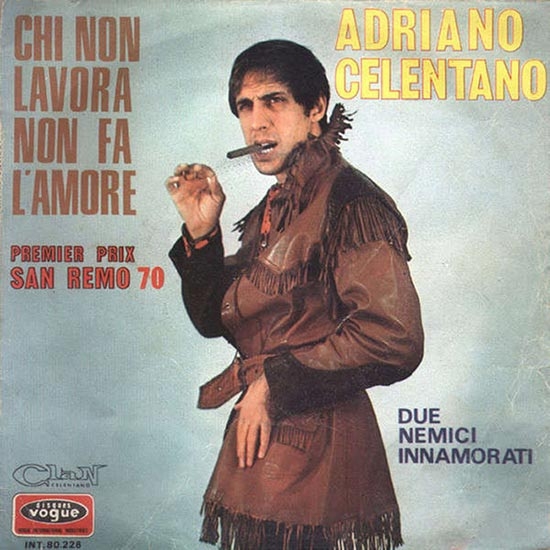SANREMO – THE 1970s

In the early nineteen-seventies the popularity of the Festival was at its peak, and in 1972 it achieved its historical record, with 26 million viewers: almost one Italian out of two watched it. Then began a decline that saw it steer clear of the most vital ferments of those years, marked by political violence.
The winning song in 1970 – Chi non lavora non fa l’amore – was an original duo in which Celentano, with his wife Claudia Mori, spoke out about the strikes that were paralyzing the country. Second came the Ricchi e Poveri with Nicola Di Bari (La prima cosa bella), third Endrigo with L’arca di Noè.
In 1971 Nicola Di Bari and Nada won with a classic Italian melody: Il cuore è uno zingaro. Che sarà with José Feliciano and Ricchi and Poveri came second, but the moral winner was Lucio Dalla with 4 marzo 1943, a fictional autobiography. Dalla would also hit the mark the following year with Piazza Grande.
In 1972 Di Bari repeated his success with I giorni dell’arcobaleno. Among the revelations, Marcella with Montagne verdi and Ivano Fossati’s band Delirium with the song Jesahel.
In 1973 the victory went to Peppino Di Capri, interpreter of Un grande amore e niente più. Then the scene became pretty desolate until the following decade, a monotony broken only in 1978 by Rino Gaetano’s debut with Gianna.
In 1974 Iva Zanicchi won with Ciao cara, come stai?
In 1975 it was the turn of Gilda, a medical student, who sang of a pure Ragazza del Sud (southern girl). Overall sales plunged to a historic low with 45 thousand copies, triggering suggestions that the event should come to an end.
In 1976 Peppino Di Capri prevailed with Non lo faccio più, while Toto Cutugno, a future champion of the Italian melody, came in third place with his band Albatros (Volo AZ 504).
In 1977 Bella da morire by the Homo Sapiens achieved the victory.
In 1978 Genoa won on all fronts, with Beppe Grillo conducting and Matia Bazar coming first with …E dirsi ciao! followed by a sixteen year-old Anna Oxa with a Fossati song (C’è una ragione).
The decade ended (1979) with Mino Vergnaghi’s victory with Amare, ahead of Enzo Carella – both to be soon forgotten – and the Camaleonti.
